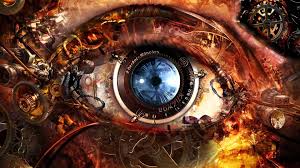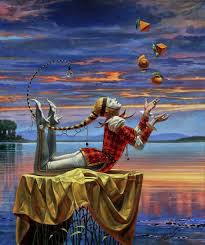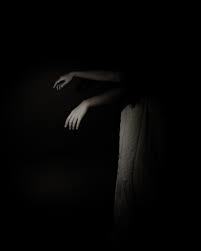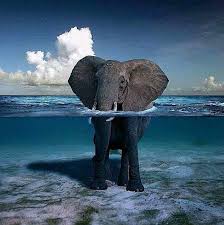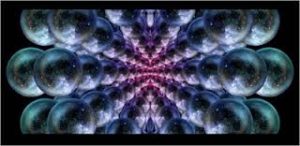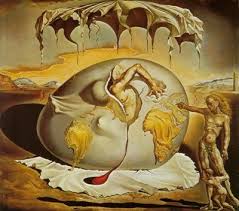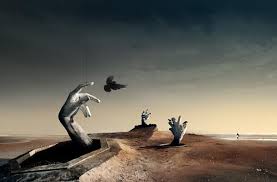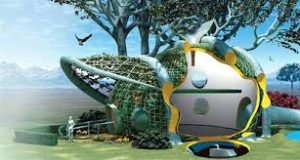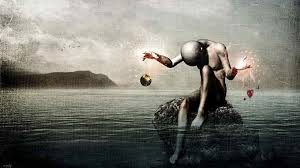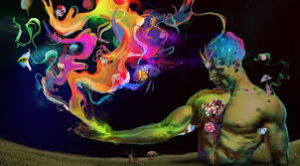These imply some pretty fantastic abilities on the part of we humans — for such developments show that even though we live as small creatures within the incredible richness of an overall consciousness, or All That Is, still our actions can result in that great consciousness exploring new areas of itself. Quite awesome creative abilities on our part, and ones that unknowingly we take for granted. We do this all of the time, of course, individually and collectively.
In the beginning, there was not God the Father, Allah, Zoroaster, Zeus, or Buddha.
In the beginning there was instead, a divine psychological gestalt — and by that I mean a being whose reality escapes the definition of the word “being,” since in it the source from which all beings emerges. That being exists in a psychological dimension, a spacious present, in which everything that was or is or will be (in our terms) is kept in immediate attention, poised in a divine context that is characterized by such a brilliant concentration that the grandest and the lowliest, the largest and the smallest, are equally held in a multi-loving constant focus.
Our conceptions of beginnings and endings make an explanation of such a situation most difficult, for in our terms the beginning of the universe is meaningless — that is, in those terms there was no beginning.
The universe is always coming into existence, and each present moment bring its own built-in past along with it. We agree on accepting as fact only a small portion of the large available data that compose any moment individually or globally. We accept only those data that fit in with our ideas of motion in time. As a result, for example, our archeological evidence usually presents a picture quite in keeping with our ideas of history, geological eras, and so forth.
The conscious mind sees with a spectacular but limited scope. It lacks all peripheral vision. I use the term “conscious mind” as we define it, for we allow it to accept as evidence only those physical data available for the five senses — while the five senses, of course, represent only a relatively flat view of reality, that deals with the most apparent surface.
The physical senses are the extensions of inner senses that are, in one way or another, a part of each physical species regardless of its degree. The inner senses provide all species with an inner method of communication. The cells, then, possess inner senses.
Atoms perceive their own positions, their velocities, motions, the nature of their surroundings, the material that they compose. Our world did not just come together, mindless atoms forming here and there, elements coalescing from brainless gases — nor was the world, created by some distant objectified God who created it part by part as in some cosmic assembly line. With defects built in, mind you, and better models coming every geological season.
The universe formed out of what God is.
The universe is the natural extension of divine creativity and intent, lovingly formed from the inside out — so there was consciousness before there was matter, and not the other way around.
In certain basic and vital ways, our own consciousness is a portion of that divine gestalt. In the terms of our earthly experience, it is a metaphysical, scientific, and a creative error to separate matter from consciousness, for consciousness materializes itself as matter in physical life.
Our consciousness will survive our body’s death, but it will also take on another kind of form — a form that is itself composed of “units of consciousness.” We have a propensity for wanting to think in terms of hierarchies of consciousness, with humanity at the top of the list, in global terms. The Bible, for example, says that man is put in dominion over the animals, and it seems as if upgrading the consciousness of animals must somehow degrade our own. The divine gestalt, however, is expressed in such a way that its quality is undiluted. It cannot be watered down, so that in basic terms one portion of existence is somehow up or down the scale from another. It is all Grade A.
We limit the capacity of our conscious mind by refusing to allow it to use a larger scope of attention, so that we have remained closed and ignorant about the different, varied, but rich experiences of other species: They do appear beneath us. We have allowed a certain stubborn literal-mindedness to provide us with definitions that served to categorize rather than illuminate other realities beside our own.
In the beginning, then, there was a subjective world that became objective. Matter was not yet permanent, in our terms, for consciousness was not yet as stable there. In the beginning, then, there was a dream world, in which consciousness formed a dream of physical reality, and gradually became awake within that world.
Mountains rose and tumbled. Oceans filled. Tidal waves thundered. Islands appeared. The seasons themselves were not stable. In our terms the magnetic fields themselves fluctuated — but all of the species were there at the beginning, though in the same fashion, for as the dream world broke through into physical reality there was all of the tumultuous excitement and confusion with which a mass creative event is achieved. There was much greater plasticity, motion, variety, give-and-take, as consciousness experimented with its forms. The species and environment together formed themselves in concert, in glorious combination, so that each fulfilled the requirements of its own existence while adding to the fulfillment of all other portions of physical reality.
That kind of event simply cannot fit into our concepts of “the beginning of the world,” with consciousness arising out of matter almost as a second thought, or with an exteriorized God initiating a divine but mechanistic natural world.
Nor can this concept fit into our versions of good and evil. God, or All that Is, is in the deepest sense completed, and yet uncompleted. Again, I am aware of the contradiction that seems to be presented to our minds. In a sense, however, a creative product, say, helps complete an artist, while of course the artist can never be completed. All That Is, of God, in a certain fashion, now — and this is qualified — learns as we learn, and makes adjustments according to our knowledge. We must be very careful here, for delusions of divinity come sometimes too easily, but in a basic sense we all carry within ourselves the undeniable mark of All That Is — and an inbuilt capacity — to glimpse in our own terms undeniable evidence of our own greater existence. We are as close to the beginning of our world as Adam and Eve were, or as the Romans, or as the Egyptians or Sumerians. The beginning of the world is just a step outside the moment.
I have a purpose in this blog — for this discussion — and that purpose is to change our ideas of ourselves, by showing a truer picture of our history both in terms of our immortal consciousness and our physical heritage.
A basic religious awareness has always been with mankind and womankind. Here are a few historical and mythological signposts of the intuitive understanding.
God the Father. There’s no way to assign any reasonably accurate date to when God the Father created all things, as described in Genesis, the first book of the Bible. (The Biblical account of Creation makes evolution an impossibility.) Nor can the date of Creation be arrived at by counting the Bible’s lists of generations, as given in the Old Testament, since these may well be incomplete.
Mohammed (A.D. 570?-632), the Prophet of Islam, stressed the uniqueness of the god Allah, whose name was already well known in pre-Islamic Arabia.
Zoroaster (628?-551? B.C.) was a Persian religious teacher and prophet.
Zeus was the supreme god of the ancient Greeks, who worshipped him in connection with almost every facet of daily life. He was the son of Cronus and Rhea, and the husband of his sister Hera. The Romans identified Zeus with their own supreme god, Jupiter, or Jove.
Buddha. This is the title given to Siddhartha Gautama, the founder of Buddhism. He was a religious teacher and philosopher who lived in India, probably from 563 to 483 B.C.
2. I see correlations between the “flat view of reality” given to us by our physical senses, and the “flat” view of the universe that cosmologists perceive when they look way out into space. In his general theory of relativity, Einstein postulated that space can curve, and this has been shown to happen near the sun. Yet when scientists examine our universe of galaxies and clusters of galaxies, they see space as essentially flat, instead of curving in upon itself as it should over those enormous distances. Nor can the big-bang theory of the origin of the universe account for the homogeneity of a flat universe. The inflationary model can explain both the appearance of flatness and homogeneity — but, like all theories, it poses other problems that have yet to be resolved.





















